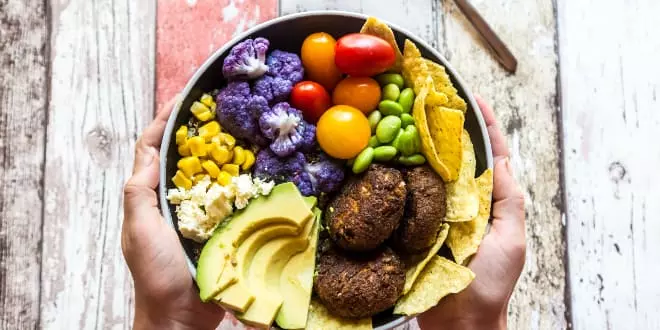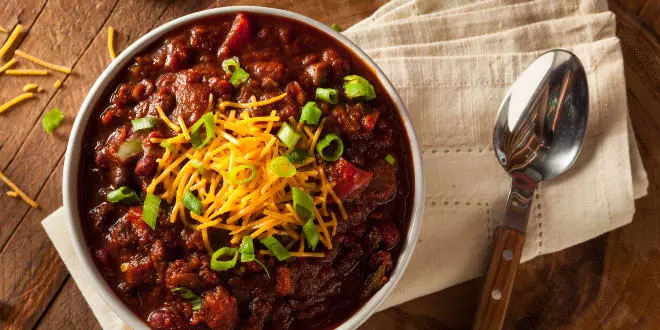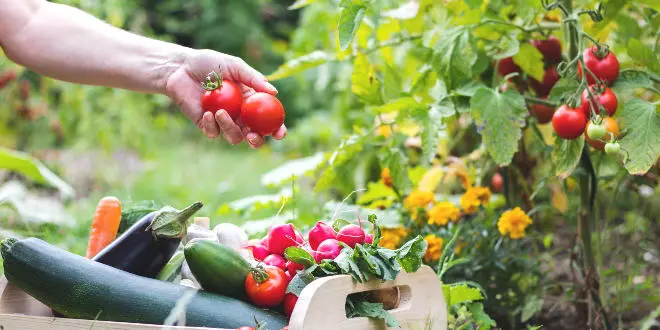How to eat ethically and sustainably on a budget
26 September 2016Food, glorious food! When it comes to what we eat, we’ve never had more choice. However, while more consumers than ever are thinking sustainably when they shop, costly organic food stores can make eating ethically on a budget feel like an intimidating task. And with the cost of living crisis tightening our belts, we need all the help we can get to follow a cheap and eco-friendly diet.
Fortunately, we have a few tricks up our sleeve to help you eat well and keep your costs low. This guide offers some easy tips, recipes, and even a seasonal food guide that shows you exactly how to eat sustainably on a budget.

- 5 ways to eat sustainably on a budget
- What is the cheapest sustainable food?
- A seasonal produce guide for the UK
- Seasonal recipes
- Our favourite seasonal cookbooks
- What about ethical fish, meat and dairy?
- Why is it important to eat sustainably?
5 ways to eat sustainably on a budget
Did you know there is no legal definition of ‘sustainable food’? That’s why you don’t find food labelled as such in your local supermarket, and it can be tricky to work out how to make the best food choices for sustainability. Here are the 5 easiest things you can do to make ethical choices while sticking to your budget.
-
Eat what’s in season
Choosing seasonal vegetables and fruit is one of the best ways to eat healthy on a budget and a low-cost sustainable option. You’ll save money as seasonal produce is generally cheaper because you won’t have to shoulder the costs of food storage or transportation. Also, when a type of food comes into season and is more readily available, it's generally sold at lower prices to keep demand high.
-
Plan meals to reduce food waste
It might surprise you that around a third of the food produced globally goes to waste. Or that the UK throws away 9.5 million tonnes of food waste in a single year. This waste emits a huge amount of greenhouse gases, so it’s better for the environment to buy only what you plan to use. Choose loose produce where possible, so you can avoid wasting money on food you’ll end up throwing out, and freeze anything you can’t eat while fresh.
If you fancy adding a little spontaneity to your life, why not sign up for the odd recipe box from Hello Fresh or Gousto? With perfectly portioned ingredients and step-by-step instructions, you could whip up a feast in the kitchen without a crumb going to waste.
-
Shift to a plant-based diet
If you grew up with meat as the centre of your meals, it might be easier to cut it down rather than out. But bear in mind that the benefits of a plant-based diet are indisputable, from less inflammation in the body to a reduced carbon footprint.
Cutting down on meat is particularly impactful for climate change. The rearing of livestock generates 14% of global carbon emissions, similar to the amount generated by all forms of transport put together. Shifting to a plant-based diet is probably the single easiest way we can reduce our impact on the planet. And as research has found that plant-based meals cost around 40% less than meals featuring meat or fish, you’ll save good money too.
-
Grow your own
Lucky enough to have a garden? Try your hand at growing your own produce to reduce your carbon footprint. Ok, we know what you’re thinking: is it really worth growing your own vegetables? Well, that depends. Some crops, such as potatoes and onions, are pretty cheap to buy in shops, so growing your own might not save you much money. But cherry tomatoes, courgettes, and runner beans can be prolific in a small space, while raspberries, strawberries, spinach and rocket are easy to grow and pricey to buy.
-
Reduce your plastic
So simple and yet so effective. Bring a reusable bag when you shop rather than forking out for carrier bags and look for sustainable food packaging like paper over plastic. Why not cut even more plastic out of your kitchen with our free voucher codes for Bower Collective? This innovative zero-waste refill brand delivers pouches of household products like detergent and washing-up liquid for you to decant into reusable containers. You simply post your empties back in the pre-paid envelope provided. Plus, with our free voucher codes, you might score yourself a discount.
What is the cheapest sustainable food?
As well as seasonal fruit and vegetables, pulses are one of the cheapest sustainable foods in the UK. Lentils, beans, and chickpeas have a low carbon footprint and don't use excessive amounts of water to produce.
Pulses are a staple of any sustainable healthy eating diet, plus they're a cheap way to eat protein — helpful if you're cutting down on meat! Fancy getting creative with the magic beans in your kitchen? Turn to Jenny Chandler, the Queen of Beans, and her bestselling Pulse cookbook for enticing recipes galore.

A seasonal produce guide for the UK
Why is it better to eat seasonal food?
Locally-sourced, seasonal produce is fresher and has a much lower carbon footprint than food that’s shipped vast distances or stored for longer periods. When those crisp apples and juicy oranges ripen naturally and are harvested at just the right time, they’ll be richer in flavour and have a higher level of nutrients. That’s just science.
By choosing locally-sourced produce, you can also avoid the kind of pesticides that might come from countries with very relaxed laws about what can be sprayed on crops. Plus, eating with the seasons will give you a new appreciation for the planet — winter vegetables offer comfort and are made for hot stews and casseroles, while summer crops provide beta-carotene that protects us from sun damage along with delicious salad vegetables for lighter meals.
Chefs such as Nigel Slater and Hugh Fearnley-Whittingstall are avid advocates of seasonal eating - and for good reason too. Here's our guide to seasonal produce in the UK:
| Season | Best for | Also in season |
|---|---|---|
| January | Clams, Kale and Carrots | Cauliflower, Leeks, Brussels Sprouts, Savoy Cabbage, Clams, Seville Oranges, Blood Orange, Cockles, Horseradish, Mussels, Artichokes, Parsnips, Swede, Truffle, Venison, Clementine, Jerusalem Artichoke, Salsify, Satsuma, Wild Duck and Winkles. |
| February | Leeks and Savoy Cabbage | Cauliflower, Carrots, Brussels Sprouts, Kale, Clams, Blood Oranges, Cockles, Oysters, Venison, Winkles and Spring Greens. |
| March | Sardines and Spring Greens | Spring Onions, Clams, Leek, Kale, Savoy Cabbage, Venison, Purple Sprouting and Cauliflower. |
| April | Lamb and Cauliflower | Crab, Rocket, Watercress, Wild Garlic, Oyster, Sardines, Spring Onions, Spring Greens, Cucumber and Kale. |
| May | Rhubarb and Asparagus | Spinach, Chicory, Gooseberries, New Potatoes, Radish, Samphire, Crab, Morels, Cauliflower, Elderflower, Nectarine and Cucumber. |
| June | Peas, Broad Beans and Strawberries | French Beans, Chicory, Crab, Mackrel, Mangetout, Rhubarb, Courgette, Asparagus, Spinach, Carrots, Radish, Rocket, Spring Onions, Tomato, Watercress, Lamb and Cucumber. |
| July | Cucumbers, Lettuce and Cherries | Apricot, Aubergine, Blackcurrant, Beetroot, Celery, Bramley Apples, Spinach, Rhubarb, Raspberries, Runner Beans, Carrots, Peas, Iceberg Lettuce, Fennel, Courgettes, Globe Artichoke, Kohlrabi, Peach, Strawberries, Blueberries, Cauliflower, Savoy Cabbage, Runner Beans, Sea Bass, Swiss Chard and Cos Lettuce. |
| August | Cos Lettuce, Raspberries and Plums | Blueberries, Celery, Cauliflower, Marrow, Strawberries, Sweetcorn, Spinach, Bramley Apples, Cucumber, Red Cabbage, Runner Beans, Broad Beans, Savoy cabbage, Spring Greens, Iceberg Lettuce, Carrots, Peas, Cherries and Courgettes. |
| September | Courgette, Blackberries and Runner beans | Red Cabbage, Damsons, Figs, White Cabbage, Marrow, Partridge, Pear, Blueberries, Iceberg Lettuce, Squash, Sweetcorn, Grouse, Lamb, Mackerel, Scallop, Rocket, Sea Bass, Swiss Chard, Wild Duck, Venison, Savoy Cabbage, Kale, Bramley Apples, Spinach, Cos Lettuce, Leeks, Plums, Pumpkin, Peas, Cucumber, Cauliflower, Celery, Carrots and Brussels Sprouts. |
| October | Sweetcorn and Apples | White Cabbage, Celeriac, Mussels, Pheasant, Salsify, Wild Mushroom, Aubergine, Squash, Red Cabbage, Kale, Savoy Lettuce, Spring Greens, Marrow, Carrots, Blackberries, Leeks, Celery, Runner Beans, Brussels Sprouts, Pheasant, Pumpkin, Winkles, Wild Mushrooms, Fennel, Globe Artichoke, Grey Mullet, Oysters, Lamb, Damsons, Swede, Pear, Sloe Berries and Potatoes. |
| November | Potatoes and Red Cabbage | White Cabbage, Brussels Sprouts, Chestnuts, Clams, Cranberries, Horseradish, Jerusalem Artichoke, Parsnips, Spring Greens, Kale, Savoy, Quince, Apples Cabbage, Leeks, Cauliflower, Carrots, Oysters, Partridge, Pheasant, Sea Bass, Venison, Mussels, Wild Duck and Brussels Sprouts. |
| December | Turkey, Brussels Sprouts and White Cabbage | Apple, Kale, Celeriac, Spring Greens, Clams, Horseradish, Jerusalem Artichoke, Oyster, Parsnips, Goose, Pheasant, Salsify, Swede, Oysters, Mussels, Savoy Cabbage, Potatoes, Carrots and Cauliflower. |

Seasonal recipes
We have hunted out some healthy seasonal recipes that make the very best of fresh UK produce.
January

After the party season has finished, this is the perfect time to fill up on warming and healthy meals made with the great winter veg that is available, such as kale and carrots. Warming vegetable soups, tasty one-pots, and bright-tasting oranges are perfect to eat throughout January.
February

Now is the time for greens. Savoy cabbage and leeks are the prime veg of the month, reap the health benefits with the filling and delicious recipes.
March

This is the month for spring greens, a delicious vegetable that works as a fantastic side not only is this vegetable cheap but you get a lot for your money!
April

Spring has sprung and with it comes a crop of new spring vegetables. Cauliflower is the star this month, spiced and roasted it is delicious in a salad, as the main part of a veggie curry or simply as a healthy side. Also, if you are out walking in the countryside keep an eye out for wild garlic which grows in abundance at this time of year.
May

This month the star has to be rhubarb - delicious both in deserts, but also as a delicious simple compote to put on breakfast and yoghurt. Asparagus, usually quite an expensive vegetable should be a little cheaper this month due to its seasonality, it works wonderfully with egg.
June

The start of summer means lovely broad beans and sweet tasting peas to add to your plate. British strawberries are also prime for the picking, delicious when scattered over cereal or just eaten on their own!
July
 Lighter meals are now on the menu. Lettuce, this month's star is delicious used as a wrap or for as part of a crisp and tasty salad. Cherries are the stand-out fruit of the season, sweet and juicy they world so well with almonds and the cherry and almond pudding below is to die for.
Lighter meals are now on the menu. Lettuce, this month's star is delicious used as a wrap or for as part of a crisp and tasty salad. Cherries are the stand-out fruit of the season, sweet and juicy they world so well with almonds and the cherry and almond pudding below is to die for.
August

Cos lettuce is crisp and delicious and works so well with lemons, like in the below salad. Raspberries should be sweet and plump during August, have fresh or preserve for a tasty jam. Plums are also prime this month, a great snack or beautiful in the plum and almond tart below.
September

If you are home-growing courgettes (definitely worth a try if you haven't as they are easy to grow even for the non-green fingered of you) September will probably provide you with an abundance of courgettes. Not only delicious as a savoury side, the below recipe for a courgette and poppy seed cake is excellent as a slightly different treat.
Blackberries are also out in full force in September, have fresh in yoghurt or why not pop a few into some cheap whisky to store as a boozy treat.
October

Autumn is now in full swing, sweetcorn and pumpkin steal the show this month. Try these delicious sweetcorn fritters which are complemented by sweet, slow-cooked tomatoes. Also, carving out your pumpkin for Halloween? Waste not, want not - use the tasty pumpkin flesh to have this warming pumpkin and chickpea tagine.
Pears are the star fruit of October - add into a crumble with apples and blackberries for a tasty desert just top off with a glug of custard.
- Sweetcorn fritters with slow-cooked tomatoes
- Pumpkin and chickpea tagine
- Apple, pear and blackberry crumble
- Grilled mushroom risotto
November

Although potatoes are a staple all year round, November is the month to load your plate with them. As the dark nights draw in what could be better than some lovely roasted potatoes covered in gravy or the below tasty herby root vegetable gratin full with creamy potato, swede, and parsnip.
Also, make a big batch of the red cabbage sauerkraut and eat with everything!
December
 December is the month of indulgence. It is also the month for plenty of warming veg. Why not throw some of the season's root vegetables - such as carrot and swede - into a slow cooker for a wonderful stew?
December is the month of indulgence. It is also the month for plenty of warming veg. Why not throw some of the season's root vegetables - such as carrot and swede - into a slow cooker for a wonderful stew?
View a printable version of the seasonal eating guide here.
How do you source local produce?
Buying local takes a little more time and planning than grabbing whatever you fancy off of the supermarket shelf. Look for farm shops, farmer’s markets, local butchers, fishmongers, and cheesemongers.
If you’re trying to keep costs low, don’t expect to do a full food shop at these places, but you can use your visit to gather information and purchase the kind of ethical items it’s hard to find in supermarkets.
What questions should you ask at your local farmer’s market? Ask about sprays, pesticides and herbicides, animal welfare, and whether they have certifications like the Soil Association gold standard for organic and ethical produce.

1. The Hand & Flowers Cookbook - Tom Kerridge
2. Season - Nik Sharma, Jon Birdsall
4. Hugh Fearnley-Whittingstall - The River Cottage Year
5. The Abel and Cole Cookbook - Easy, Seasonal, Organic
What about ethical fish, meat and dairy?
When it comes to food choices and sustainability, the world of fish, meat and dairy can be tricky to navigate. Here’s what to look out for:
Meat and eggs
Only meat carrying the Pasture for Life logo has been 100% grass-fed. Otherwise, the animals may only have been partially grass-fed with unnatural feed like grain and cereal used to increase weight gain before slaughter.
The Soil Association is the UK’s oldest and largest organic certification organisation. And the presence of its logo also reflects the highest standards of animal welfare in the UK. Unlike RSPCA Assured, the Soil Association only accredits free-range producers, so animals have adequate access to the outdoors and actually see the light of the sun. This certification also means that animals are not treated with preventative antibiotics or fed GM food.
Fish
Can’t resist a fish dinner? Head straight to the Marine Conservation Society’s Good Fish Guide to discover everything you need to know about fish sustainability. Our oceans are becoming dangerously overfished with industrial vessels and unregulated fishing damaging our delicate ocean ecosystem. So, it's important to not only choose the right species but to choose ethically-sourced fish too.
Wild-caught Alaskan salmon, European hake, and farmed molluscs like clams, mussels, and oysters are some of the best sustainable seafood choices. While bluefin tuna, grouper, and Atlantic cod are just a few of the fish to throw back into the sea.
Milk
The BBC’s Science Focus suggests that all non-dairy milks are better for the environment than cow’s milk. So, perhaps it’s time to push dairy aside and find a suitable replacement for your coffee.
The award for plant-milk with the lowest greenhouse gas emissions goes to almond milk, although it does require the most water to produce. Soy is arguably the most eco-friendly plant-milk as it uses the least amount of water and only creates slightly higher emissions.

Why is it important to eat sustainably?
The issue of climate change can't be ignored. We need to do what we can to protect the planet and future generations. The way we have chosen to shop and eat has placed giant stress on the environment, contributing to climate change through deforestation, the use of pesticides, soil loss, overfishing, and more.
We need to act now and make the changes we can to avoid wasting natural resources and causing more damage to the planet. We can all make sustainable eating a part of our daily lives without it costing the earth.
As well as sustainable food practices at home, you can live more sustainably with our fantastic free voucher codes. Discover our discounts for some of the best sustainable brands in the UK, from ethical clothing businesses to zero-waste refill brands, and save yourself money while putting the planet first.